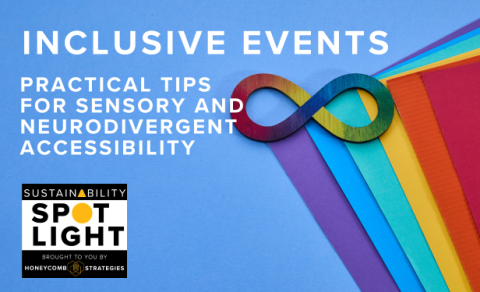Inclusive Events: Practical Tips for Sensory and Neurodivergent Accessibility

Exclusively sponsored by Honeycomb Strategies
A sustainable event includes an atmosphere where everyone feels welcome and comfortable. Planning an event to be inclusive and friendly to people with sensory challenges or neurodiversity (neurodivergent is an umbrella term that refers to a myriad of common neurological differences such as autism spectrum disorder and attention deficit hyperactivity disorder) will ensure the whole community has the opportunity to connect and engage with industry offerings and environmental initiatives.
Here are seven practical ways to make events more accommodating.
-
Designate a Quiet Room
Create a separate space where attendees can retreat from the noise and activity of the event. This room should be away from the main activity, softly lit, with comfortable seating and minimal decoration to avoid overstimulation. It’s important to enforce that this is not a workspace or a spot for phone calls, so this area serves as a sanctuary for those who need a break from the hustle and bustle, providing a peaceful environment to relax and recharge.
-
Standing Room/Roaming Room During Sessions
Designate specific areas where attendees can stand or move around during sessions. This accommodation is particularly beneficial for those who find sitting still for long periods challenging. It allows individuals to engage with the content while remaining comfortable.
-
Closed Captioning
Including closed captions on all videos ensures that individuals who are deaf or hard of hearing can fully participate and aids those who might find it difficult to process auditory information quickly. Make sure all multimedia presentations, including live streams, have captions available.
-
Simple Daily Schedule Emails
Allow attendees to sign up for simple daily schedule emails. These emails should include only the essential information about the day’s events, helping attendees plan without feeling overwhelmed by excessive details. This can be particularly helpful for individuals who thrive on routine and clear, concise information.
-
Advance Warning of Loud Noises
Giving advance warning of loud noises like bells or planned fire alarms can prevent unnecessary distress. For example, you might announce, “In 10 minutes, there will be a brief loud noise for a fire drill. Please be aware and prepare accordingly,” and include these bulletins in daily digital communications. Such notifications allow attendees to brace themselves or use ear plugs.
-
Resources for Speakers
Provide speakers with resources on developing presentations that cater to different learning styles. Encourage them to use visual aids, clear structure and variety to ensure their content is engaging and accessible to all attendees. This approach helps in accommodating diverse cognitive processing styles.
-
Sensory Tools
Offer sensory tools such as weighted lap pads, weighted vests or wiggle cushions. These occupational therapy-approved items can help individuals with sensory processing needs to remain calm and focused. Ear plugs can be helpful to manage auditory sensitivities (look for products made with eco-friendly materials and biodegradable packaging instead of foam and plastic), and portable white boards for doodling can be soothing for those who find it easier to concentrate while engaging in a low-key physical activity. A sponsorship – either accessibility related or sustainability focused – can offset the costs of these materials.
These strategies create an inclusive event environment that respects and accommodates the diverse needs of all attendees. This not only enhances the experience for those with sensory challenges or who are neurodivergent but also promotes a culture of inclusivity and understanding.
Honeycomb Strategies specializes in impactful solutions for sustainable events, sports and venues. hcsustainability.com/hello@hcsustainability.com


Add new comment